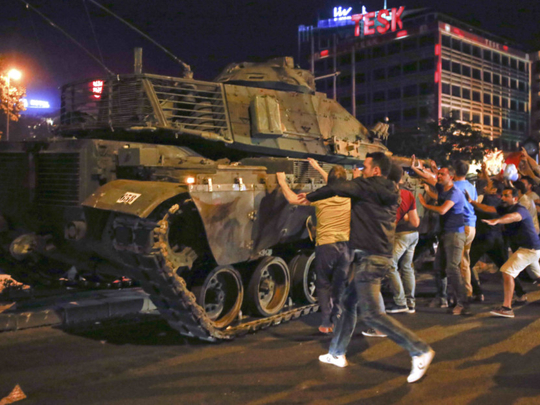
The failure of the Turkish coup presents an opportunity to discuss the power of the Turkish people, who held on to their political parliamentary system and democratically elected leaders, said the London-based Pan-Arab paper Al Quds Al Arabi. “It has to be said that a number of decisions by Turkish President Recep Tayyip Erdogan, such as his attempt to make decisions uniform between the government and army, was viewed locally and internationally as a step that aimed to consolidate the authority of Islamists in Turkey over other local political parties. The key lesson here is that the Turkish people made a firm decision to protect their democratic political system and dismiss any possible military coups.”
Perhaps the biggest shock that accompanied the failed Turkish coup were the positions of the United States and Europe, said Qatar’s Al Sharq. “The stand taken by the US and Europe was quite shocking. This was a failed military coup against a democratically-elected government, which is taking firm and steady steps in its successful development and political march. Aside from their very slow response in voicing support for the legitimate Turkish government, European and American officials began issuing statements regarding legal procedures taken by the country to eradicate the coup and rebels, placing those procedures under a microscope. This made it seem as if the problem was in the government’s legal actions, not the actual heinous crime of attempting a coup to destroy a democracy. A coup against the constitution is a crime of the highest order. One can only hope that the international community would regain its senses and refrain from double standards.”
An attempt to overthrow a democratically-elected government certainly must not be taken lightly, and all measures must be taken in accordance with the law to bring those involved to justice, said the Jordan Times. “However, state authorities have to ensure that any measures taken in the aftermath of the failed coup would not undermine the rights of the minority and the opposition, but — on the contrary — show due respect to them and their concerns, particularly that they acted in a chivalrous manner by doing the right thing: Supporting the democratically-elected government. The Turkish government, as it deals with security challenges in a volatile region, can capitalise on this unity to shore up democracy and ensure that no similar attempts can be made in the future to change the government by force.”
The attempt has thrown the spotlight on to the grave political problems that Turkey has been facing, wrote Lebanon’s Daily Star. “President Erdogan faces two options. He may use this opportunity to grasp more personal power and enact harsher measures to crush dissent and hunt down his enemies and their sympathisers in a witch hunt. Or, Erdogan could use this opportunity to examine the roots of the discontent that led to his attempted ouster and try to tackle the grievances that took his country to the brink. Now is the time to reflect upon this, as well as Turkey’s relations regionally and internationally, before deciding whether increased authoritarianism is the answer. In the end, last Friday night’s coup has the potential to be a lesson for Turkey’s government, making it stronger, more humane and closer to stability.”





_resources1_16a31069e4e_small.jpg)





